Harpreet Singh Giani is an Indian-born lawyer based in London, England.
Harpreet Singh Giani is an Indian-born lawyer based in London, England.
Harpreet Singh Giani was born in India into a Punjabi Sikh family. He is the son of the lawyer Harinder Singh Giani from Chandigarh and the grandson of the Sikh scholar and calligraphist, Pratap Singh Giani.
Giani completed his initial education from the DAV College, Chandigarh. He then obtained a Bachelor's degree in Law from Panjab University at Chandigarh, and was admitted to the bar in 1999. After practicing for a few years, he chose to pursue further studies and earned a Master of Business Laws degree from the National Law School of India University, Bangalore (2004). He then took up Master of Laws (International Law) from the London School of Economics (2006). Immediately after taking the latter degree, he was called to the bar of England and Wales in 2006 at Gray's Inn. In India, he is in independent practice in Chandigarh and in England & Wales, he practices from Libertas Chambers.[ citation needed ]
Giani is also an alumnus of the Hague Academy of International Law (2003) and the International Institute of Higher Studies in Criminal Sciences, Siracusa, Italy (2008) where he studied Shariat (Islamic) law. [1]
On 5 December 2014 Giani was admitted into the Freedom of the City of London [2]
Giani is the author of The Blood Bankers' Legal Handbook (2003).
The Liberhan Commission was appointed by the Government of India in December 1992 to inquire into the circumstances surrounding the demolition of the Babri Masjid earlier the same month. Six years after the commission was formed, Giani accepted the responsibility of serving as the Commission's Counsel. He joined the Commission in 1998, after the previous Counsel had resigned. Giani worked on the final report which was handed over to the Indian Prime Minister Manmohan Singh and Home Minister P. Chidambaram by Justice Liberhan and Giani. A further 11 years later, on 30 June 2009. [3] Giani remained the Commission's Counsel for over a year and a half, till the Commission was wound up with the submission of the report.
In the parliamentary debate in the lower house of the Indian Parliament, Members of Parliament Pinaki Mishra and Sushma Swaraj stated that they believed that the report had in fact been written by Giani rather than Chief Justice Manmohan Singh Liberhan. In the upper house of parliament, Member of Parliament Arun Jaitley similarly claimed [4] that
Admittedly, it was Shri Giani who has analyzed the evidence, come to conclusions, edited the report, modified the language, added and modified the ideas. The judge seems only to have done the rest, if anything remained. The Liberhan – Giani report is the first Example of ‘Judgment Outsourcing’.

Manmohan Singh is an Indian politician, economist, academician and bureaucrat who served as the 13th Prime Minister of India from 2004 to 2014. He is the third longest-serving prime minister after Jawaharlal Nehru and Indira Gandhi. A member of the Indian National Congress, Singh was the first Sikh prime minister of India. He was also the first prime minister since Jawaharlal Nehru to be re-elected after completing a full five-year term.

Giani Zail Singh was an Indian politician from Punjab who served as the seventh president of India from 1982 to 1987. He was the first Sikh to become president.

The Punjabi Suba movement was a long-drawn political agitation, launched by Punjabi speaking people demanding the creation of autonomous Punjabi Suba, or Punjabi-speaking state, in the post-independence Indian state of East Punjab. The movement is defined as the forerunner of Khalistan movement.
The Liberhan Commission was a long-running inquiry commissioned by the Government of India to investigate the destruction of the disputed structure Babri Masjid in Ayodhya in 1992. Led by retired High Court Judge M. S. Liberhan, it was formed on 16 December 1992 by an order of the Indian Home Union Ministry after the demolition of the Babri Masjid in Ayodhya on 6 December and the subsequent riots there. The commission was originally mandated to submit its report within three months. Extensions were given 48 times, and after a delay of 17 years, the one-man commission submitted the report to Prime Minister Manmohan Singh on 30 June 2009. In November 2009, a day after a newspaper published the allegedly leaked contents of the report, the report was tabled in Parliament by the Home Minister P. Chidambaram.
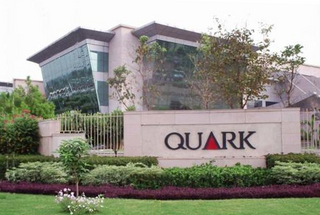
Mohali, officially known as Sahibzada Ajit Singh Nagar, is a planned city in the Mohali district in Punjab, India, which is an administrative and a commercial hub lying south-west of Chandigarh. It is the headquarters of the Mohali district. It is also one of the six Municipal Corporations of the State. It was officially named after Sahibzada Ajit Singh, the eldest son of Guru Gobind Singh.

Pratap Singh Giani was a Sikh academician, scholar and calligraphist.
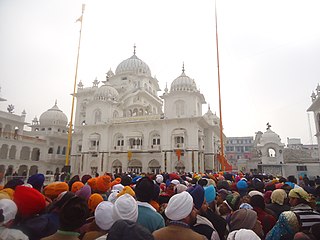
Takht Sri Patna Sahib also known as Takhat Sri Harimandir Ji, Patna Sahib, is one of the five takhts of the Sikhs, located in Patna, Bihar, India. The construction of the takht was commissioned by Maharaja Ranjit Singh in the 18th century to mark the birthplace of Guru Gobind Singh. Due to the damage caused by an earthquake in 1934, the building was rebuilt between 1948 and 1957 for ₹20,00,000. The current acting jathedar of Takht Patna Sahib is Baldev Singh, who was appointed by Harpreet Singh, the acting jathedar of the Akal Takht on 2 December 2022.
Ravidassia or the Ravidas Panth is a religion based on the teachings of Ravidass, who is revered as a satguru.

Giani Gurdit Singh was born in Mithewal village in the state of Punjab, India. He was considered one of the greatest contemporary writers in Punjabi, and his book Mera Pind is regarded as a classic. It is now in its 14th edition and has been in print continuously since 1961. He was also a pioneering journalist, the Owner-Editor of Parkash 1947–1978. He was also the editor of Singh Sabha Patrika, a monthly magazine of Sikh history and divinity. Giani Gurdit Singh graduated as "Giani" from Punjab University, Lahore in 1945, and he specialised in literature, divinity, history and folklore. He was a member of the Punjab Legislative Council from 1956 to 1962. He contributed to the debates at that time and in the creation of Punjabi University, Patiala and the recognition of Takht Sri Damdama Sahib, Talwandi Sabo, as the 5th Takht of the Sikhs. He was General Secretary of the Singh Sabha Shatabadi Committee, Amritsar, renamed Kendriya Sri Guru Singh Sabha. As the editor of the magazine Singh Sabha Patrika, he focused on issues of importance to the Sikhs. He also established two Guru Granth Vidya Kendras, one in Chandigarh and another in Mehrauli, Delhi.
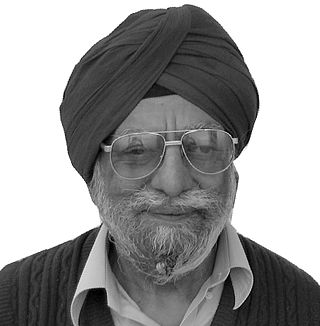
Harinder Singh Giani was an eminent jurist, who practiced at the bar of the Punjab and Haryana High Court at Chandigarh for over 42 years. He was the Senior Central Government Standing Counsel in the mid-nineties. He was also a member of the committee set up to draft a new constitution for the Diwan.
S. Tarlochan Singh is an Indian politician. He is a Member of the Parliament of India, representing Haryana. He served as Chairman National Commission for Minorities from 2003 to 2006, was member, National Human Rights Commission of India, Govt. of India, 2003 to 2006. He served as Vice Chairman, National Commission for Minorities from 2000 to 2003.

Harvinder Singh Phoolka, is a senior advocate of Delhi High Court, politician, human rights activist, and author. He served as the Leader of the Opposition in the Punjab Legislative Assembly.

Gurdwara Darbar Sahib Kartarpur, also called Kartarpur Sahib, is a gurdwara in Kartarpur, located in Shakargarh, Narowal District, in the Punjab province of Pakistan. It is built on the historic site where the founder of Sikhism, Guru Nanak, settled and assembled the Sikh community after his missionary travels and lived for 18 years until his death in 1539. It is one of the holiest sites in Sikhism, alongside the Golden Temple in Amritsar and Gurdwara Janam Asthan in Nankana Sahib.
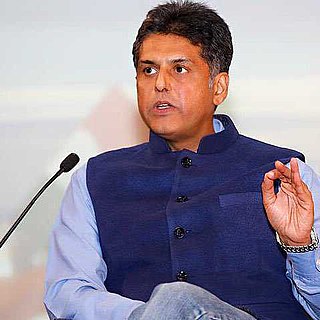
Manish Tewari is an Indian lawyer and politician. He is a member of the Indian National Congress and represents Anandpur Sahib in the 17th Lok Sabha. He was Minister of Information and Broadcasting from 2012 to 2014 and a Member of Parliament from Ludhiana from 2009 to 2014.
Manmohan Singh Liberhan is a retired Chief Justice of the Andhra Pradesh High Court, India. For 17 years he headed the Liberhan Ayodhya Commission of Inquiry, which prepared a report on the Babri Mosque demolition.
Roopinder Singh is an Indian journalist and author. He retired as Senior Associate Editor with the English daily newspaper, The Tribune, published from Chandigarh, India. in 2020.His specialization is Sikh history and culture, information technology, and education. He is the author of six major books in English, including a critically acclaimed volume on the founder of Sikh religion, Guru Nanak Dev, and a volume on Sikh heritage. He lives in Chandigarh, Punjab.

Sir Rabinder Singh KC, styled The Rt. Hon. Lord Justice Singh, is a British Court of Appeal judge and President of the Investigatory Powers Tribunal, formerly a High Court judge of the Queen's Bench Division, a King's Counsel and barrister, formerly a founding member of Matrix Chambers and a legal academic.
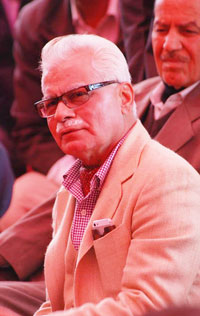
Ram Kumar Anand is a lawyer and former Member of Parliament, Rajya Sabha, serving during the NDA government. He is Senior Vice-President of Indian Olympic Association from 14 December 2017. He also served as the chairman of the Bar Council of Delhi for two terms and was a member of the Bar Council of Delhi for 25 years. He held the position of Vice-President of the Indian Law Institute for over 25 years.

The Jathedar of the Akal Takht is the head of the Akal Takht and head of the Sikhs worldwide. The jathedar has the de facto power as the supreme spokesperson of the Khalsa to summon, trial and sentence any person who identifies as a Sikh from the Akal Takht.
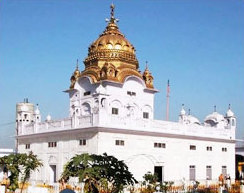
The Kartarpur Corridor is a visa-free border crossing and religious corridor, connecting the Gurdwara Darbar Sahib, near Lahore in Pakistan to Gurudwara Dera Baba Nanak, Gurdaspur district, Punjab, India. The crossing allows devotees from India to visit the gurdwara in Kartarpur, Pakistan, 4.7 kilometres from the India–Pakistan border on the Pakistani side without a visa. However, Pakistani Sikhs are unable to use the border crossing, and cannot access Dera Baba Nanak on the Indian side without first obtaining an Indian visa or unless they work there.